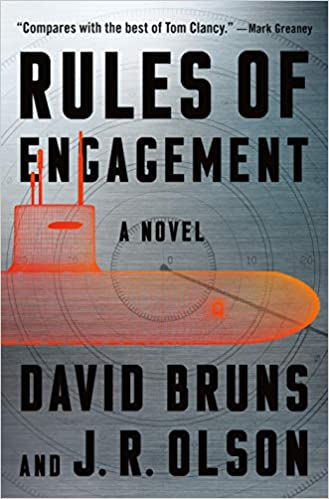
Reviewed by Diana L. Ahmad
Anyone who has ever worked with a computer, has watched NCIS, or wondered what the flashing blips are on their laptop will enjoy this book. Written by two Annapolis graduates, Rules of Engagement looks at the possibility of an enemy of the United States breaking the military computer codes of the United States, China, and Japan. The enemy is a disgruntled Iranian, Rafiq Roshed, and his desire to have those three nations attack one another.
The book is made up of sixty-six very short chapters, each dealing with different groups in the novel, such as the North Koreans who believe Roshed is helping them, the CIA, US Cyber Command, various naval vessel commanders, and even private security contractors. Roshed is set on destroying the West and works with North Korea. The North Koreans believe that Roshed is working for them not realizing that Roshed is planning his own destruction of the major powers. His computer program has the ability to learn and feeds off of the programs in each of the nations that Roshed hopes to destroy.
The first third of the book is slow reading, yet is necessary to set up the characters and the theme of the novel. In the next one third, the action picks up, but the authors introduce characters, such as private security contractors, that are unnecessary to the plot. The authors saved the best parts of the story for the last 100 pages. There, Roshed’s cyberwarfare specialist, Yun So-won, a North Korean female programmer, manages the computer system and manipulates the Chinese Navy to destroy a United States Navy aircraft carrier and several other vessels, along with over six thousand crew members. With that attack, the reader expects the United States to retaliate in some fashion, yet nothing happens. The two nations do not even consult each other about what has occurred and the authors offer no hint as to why there was no retaliation suggested on either side. This is only one of the attacks that seems to go unnoticed by the leaders of the nations involved.
Roshed managed to get into the American computers as a result of a Navy officer, Lt. Cmdr. Weston Merville, the IT Department Head, introducing a program into the Navy’s computers that took over the American systems in order to save himself the embarrassment of admitting to being taken in by a beautiful female spy. The Navy managed to capture Lt. Cmdr. Merville, yet what happens to him remains unknown.
The heroes of the novel are midshipmen from the United States Naval Academy who understand coding and all of its nuances. The end of the novel is exciting, but I will not offer any spoilers here. While the novel deals with the efforts to stop Roshed’s computer program from eventually launching nuclear missiles, the question I am left with is why China, Japan, and the United States do not talk to each other while their ships, helicopters, and crew are being destroyed?
Rules of Engagement. By David Bruns and J. R. Olson. New York: St. Martin’s Press, 2019.
Reviewed by Diana L. Ahmad, Missouri University of Science and Technology
Purchase your copy today! amzn.to/34rS7w3

